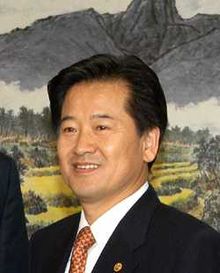- Chung Dong-young
-
Chung Dong-young 
Korean name Hangul 정동영 Hanja 鄭東泳 Revised Romanization Jeong Dong-yeong McCune–Reischauer Chǒng Tongyǒng Chung Dong-young (born July 27, 1953 in Sunchang County, North Jeolla) is a politician and was the United New Democratic Party candidate for President of South Korea in 2007.
From April 2004 until December 2005, Chung was the South Korean Minister of Unification. Before holding that post, he served two terms in the National Assembly with the National Congress for New Politics and the Millennium Democratic Party, respectively; has twice been chairman of the Uri Party; and was considered a strong contender to succeed Roh Moo-hyun as president. Like Roh, Chung is also a Roman Catholic.[1][2]
He has a bachelor's degree in Korean History from Seoul National University (1979) and master's from the University of Wales, and before entering politics, he was a journalist and anchor at the Politics Section of the Munhwa Broadcasting Corporation.
During his tenure as Unification Minister, Chung was a strong supporter of the Sunshine Policy. He was criticized for his not taking a tougher stance on North Korea, and rhetorical clashes with the United States that helped weaken relations between the two countries. He was even accused of attempting to distract reporters from a meeting of activists for human rights in North Korea. (Korean link)
In March 2007, while visiting the North Korean town of Kaesong where South Korean companies are set up, he proposed that an inter-Korean summit be organized there.[3] It never materialized.
On October 15, 2007, the United New Democratic Party announced that Chung won about 44 percent of the votes in the party primary, beating two other candidates, to become the party's candidate for the presidential elections that year.[4]
Chung, however, lost the elections to the opposition's Grand National Party candidate Lee Myung-bak by the widest margin since direct elections began in 1987. The loss was attributed primarily to Chung's unsuccessful campaign strategies and his link to President Roh, who had grown exceedingly unpopular for his failed economic policies and political blunderings.[5] Chung was often criticized for being overly critical of his political opponents without any self-reflection on his own failings. Despite this, he stated that should turnout for the presidential elections be under 50% (knowing this was predicted and occurred in the last election) that the legitimacy of the result may be an issue.[6] Voter turnout was 62.9%.
Earlier, Chung also criticized opposition leader Park Geun-hye of the Grand National Party for immediately campaigning during that party's primaries after her recovery from an attack by a man who slashed her face with a small knife. Later, he blamed the attack for the downfall of his party, even though polls showed the Uri Party would lose by a large margin anyhow. (Korean link)
The Uri Party suffered a major defeat in the elections in which the opposition Grand National Party took 13 of the 16 provinces and major cities, while Chung's party only won in North Cholla province. Chung soon resigned as chairman of the Uri Party.
See also
Notes
- ^ [Opinion] Auspicious Grave Site
- ^ "Meet the Presidential Candidate Mr. Chung, Dong-Young"
- ^ Kim Sue-young, "Ex-Uri Head Proposes Korean Summit in Kaesong", in The Korea Times, 28 mars 2007
- ^ "Uri Party leader quits following shocking local election defeat", Yonhap News, May 1, 2006.
- ^ http://www.koreaherald.co.kr/NEWKHSITE/data/html_dir/2007/12/19/200712190030.asp
- ^ http://www.chosun.com/politics/news/200605/200605310181.html
External links
- (Korean) Homepage
- "Uri Party leader quits following shocking local election defeat", Yonhap News, May 1, 2006.
- "Front-runners trade barbs as leadership competition heats up", The Korea Herald, February 2, 2006.
- Interview with OhmyNews, December 6, 2004.
- "Unification a Personal Struggle for Chung Dong-young", The Korea Times, May 30, 2004.
- "Senior Citizens Demand Uri Party Chairman Quit Politics", The Korea Times, April 4, 2004.
- "New Chairman Chung Dong-young of the Uri Party", The Dong-A Ilbo, January 11, 2004.
Preceded by
Jeong Se-hyunUnification Minister of South Korea
June 2004–December 2005Succeeded by
Lee Jong-seokPreceded by
Jeong Se-hyunChairman of the National Security Council
June 2004–December 2005Succeeded by
Lee Jong-seokPreceded by
Im Chae-jung
Moon Hee-sangChairman of the Uri Party
January 10, 2004–May 2004
February 16, 2006–June 1, 2006Succeeded by
Shin Ki-namCandidates in the South Korean presidential election, 2007 Liberals
(Pro-Govt Primary)Democratic PartyLee In-je · Jang Sang · Kim Min-seok · Shin Guk-hwan

Conservatives
(GNP Primary)IndependentProgressives
(DLP Primary)Independents Huh Kyung-young (Republican) · Geum Min (Socialist) · Chung Kun-mo (True Owner Coalition) · Chun Gwan (CSFTA)Resigned Sim Dae-pyong (People First Party) · Lee Soo-sung (People's Coalition for Unity and Advance)Official candidates in small capsCategories:- 1953 births
- Alumni of the University of Wales
- Living people
- South Korean diplomats
- South Korean Roman Catholics
- Government ministers of South Korea
- United New Democratic Party politicians
- Democratic Party (South Korea, 2005) politicians
- Uri Party politicians
- Members of the National Assembly of South Korea
Wikimedia Foundation. 2010.
